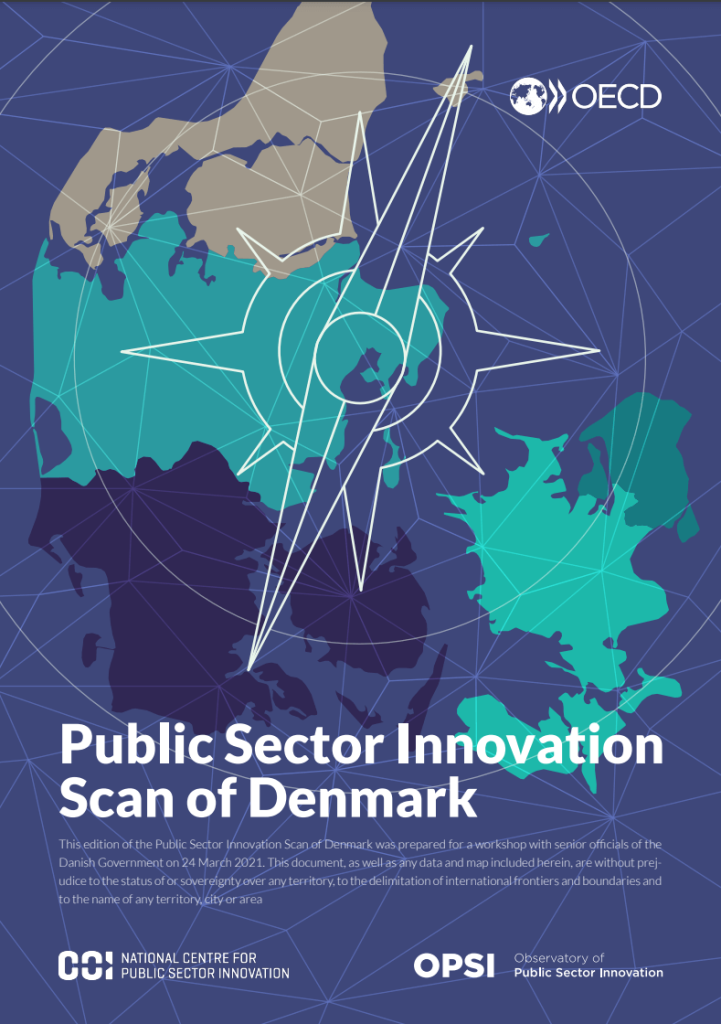Public Sector Innovation Scan of Denmark

Introduction
OECD-OPSI conducted a scan of the public sector innovation system of Denmark in partnership with the Danish National Centre for Public Sector Innovation (COI). The aim of the scan is to provide COI with an independent overview of the drivers, supports, organisational and systemic factors that influence the development and diffusion of innovation in the Danish public sector. The scan includes insights on how innovation works across levels of government. This work represents an opportunity for officials to take stock of and reflect on the current developments and achievements, and make intentional, informed decisions about innovation’s role in achieving public sector goals.
This findings of this work highlight that while the Danish government is quite advanced in its approach to public sector innovation, there remains an opportunity to develop a more consistent and deliberate approach to innovation. Going beyond responding to immediate priorities and marginally improving what already exists, the government can help solve complex societal challenges and prepare for tomorrow’s challenges in innovative ways.
Over the course of decades, the public sector of Denmark has showcased how innovation can be used to improve efficiency and effectiveness of public services. Some of the features that appear to characterise the existing system include the prevalence of bottom-up innovation, the professionalism of the Danish public service, cultural tendencies that favour innovation and the continued drive of public servants to develop and deliver quality policies and services for the population. However, key societal challenges, notably, climate change and an ageing population, represent a need for improvement in how innovation is supported and leveraged in the public sector. In addition, governments around the world continue to look for anticipatory practices that support proactive approaches to uncertainty and change, which are largely absent in the public sector of Denmark.
In the face of these complex challenges, innovation needs to be viewed as a system and deliberately steered and supported. The decentralized and devolved governance structure of Denmark has led to an affinity for bottom-up, citizen-focused innovation efforts, but this must be paired with strategic direction and supports from the centre to ensure that innovation focuses on both immediate needs and complex, long-term challenges. In this context, there is a need for a strategic approach to innovation and its supports that connects a diversity of innovation efforts.

The rise and fall of the Minister of Public Sector Innovation
In 2016, the Danish government established the position of a Minister for Public Sector Innovation within the Ministry of Finance. The goals of the minister were to implement the coherency reform programme (transparency, digital transformation, simplifying lives). While establishing this position demonstrated a political priority in the area of innovation, there was little knowledge of the Minister’s role, and the position ceased to exist after the government term ended in 2019. One reason for the former could have been the fact that a support structure that would have speared on more strategic initiatives at the Ministry of Finance was missing and the role was absorbed into day-to-day politics.
???????? Denmark
Denmark also has an opportunity to lead in areas where efforts are lagging globally. In order to lead in these areas, the public sector culture in Denmark needs to be, first, open to experimentation, as well as the risks of failure associated with innovation projects. Such a culture needs to be openly supported by leaders and politicians both in words and in action: this may require further capacity building and knowledge at both the leadership and working levels. Second, in a context of decentralised and devolved governance, mechanisms for collaboration, idea sharing, scaling and spreading of innovation across sectors, horizontally across levels of government, and vertically between levels of government, need to be established and accelerated. Third, innovation needs a strong sense of direction, paired with support for a diversity of innovation approaches, to create alignment between many actors working on societal challenges. Finally, innovation needs to be evaluated and critically examined in order to ensure that regardless of the outcomes, innovation projects are a source of learning and knowledge.
Based on the exploratory research conducted by the OECD, this scan highlights steps for Denmark to consider in order to build on the existing innovation capabilities of the Danish public sector to strengthen the innovation system even further. These considerations are largely centred around the need to support innovation that is focused beyond improving efficiency, fostering bottom-up ideas and insights and dealing with immediate concerns:
- Leverage mission-oriented innovation approaches
- Establish consistent funding for innovation
- Build anticipatory innovation governance capacity
- Improve capacity for evaluation and learning
- Outline an overarching innovation strategy
In the context of growing complexity and uncertainty, made even more clear by the COVID-19 crisis, innovation is both a fundamental necessity and an opportunity to ensure that the Government of Denmark continues to steer towards the best possible outcomes for society. The above recommendations are based on the premise that the public sector innovation system is dynamic and evolving. As such, these considerations are designed to support Denmark in choosing a path through the uncertain future, but also to structure learning and feedback loops to systematically and reliably adjust course in alignment with Denmark’s goals.

Public Sector Innovation Scan of Denmark
Published on 24 March 2021.
